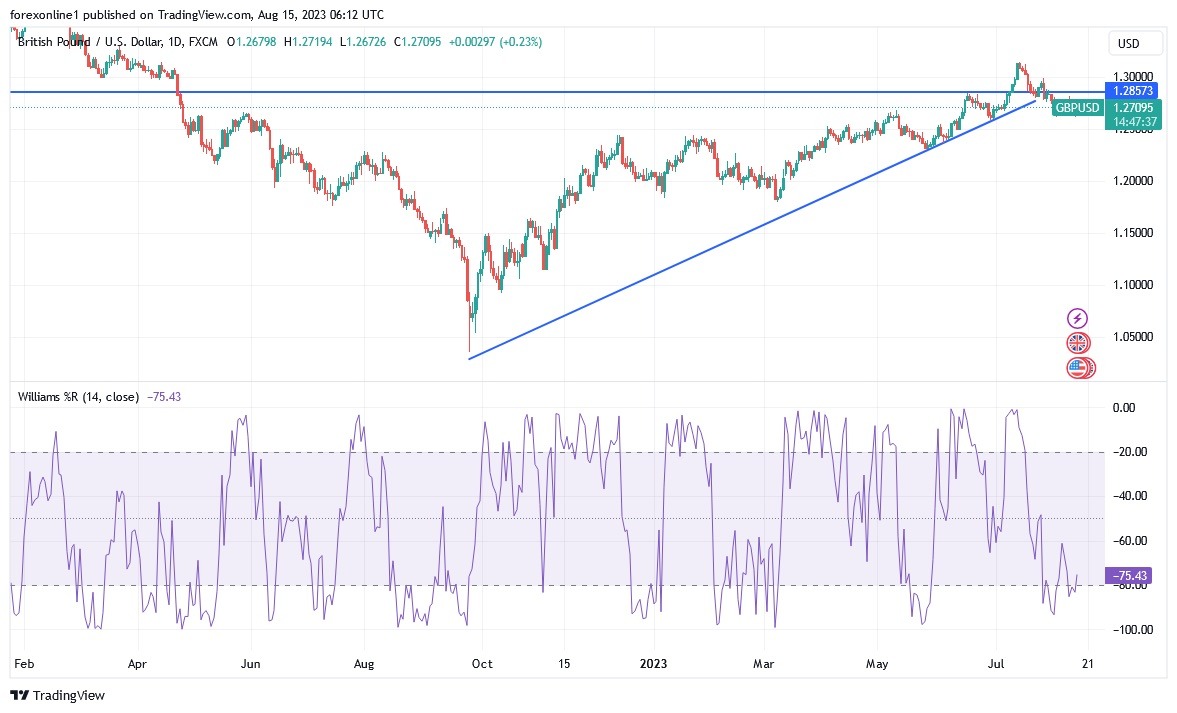[ad_1]
More recently, the continued crunch in official data has broken with the poll’s suggestion that wage growth should have peaked.
- The GBP/USD exchange rate has fallen sharply from its highs in early July, but now the risk is that any attempt at recovery is stalled on Wednesday by the ebbed wave of UK inflation, leaving Sterling unable to sustain any momentum.
- Then it advanced above the 1.28 level. Overall, the British Pound entered the new week’s trading near the important technical support around 1.26 on the charts, after the UK’s economic growth figures came out much stronger than expected for the second quarter on Friday, only for the resulting rally to fade quickly before the weekend.
Forex Brokers We Recommend in Your Region
See full brokers list
Accordingly, the decline in the market’s appetite on Friday led to the pound sterling ending last week’s trading in decline against the US dollar, while leaving it in the middle of the major currency table for the period, and the Canadian dollar, the euro and the Swiss franc were the only others who were able to move forward. The pound rose the most in relation to the New Zealand dollar, the Swedish krona, the Australian dollar and the Japanese yen, but its outlook this week hinges on the implications for interest rates of the latest wave of economic data from Tuesday.
In this regard, Samuel Tombs, chief economist at Pantheon Macroeconomics, said that, “We suspect that the CPI numbers for July, due next Wednesday, will have a decisive impact on the markets, which are pricing in about an 80% chance of a 25 basis point increase in the bank interest rate in the future.” The next Monetary Policy Committee meeting is on September 21.”
“The core rate is likely to have fallen to 6.8%, from 7.9% in June, which matches the Bank of England’s forecast in last week’s monetary policy report,” he added.
Wednesday’s release of inflation figures for July is the highlight of the week and month due to its potentially important implications for the Bank of England’s (BoE) interest rate outlook, but the knock on sterling is likely to be limited. The consensus indicates that UK inflation is likely to decline sharply to around 6.9% in July and that the more important core inflation rate eased from 6.9% to 6.8%, with divergence in how statistical and other factors affect food and energy prices.
Expected declines in inflation, or any larger declines, would question the prevailing assumption that the UK Bank Rate is likely to rise more than the current 5.25% in September and could dampen market appetite for the pound, although there are other reasons. The reasons for mid-week losses are only limited.
Low inflation has a negative effect on currencies when it leads to market expectations of lower interest rates, although the performance orders among the major currencies for the last week and month were in favor of those currencies and countries where inflation has declined the most this year. The latter is one of the reasons why any losses for the pound will be limited in the mid-week trading session, meanwhile sterling is likely to benefit on Tuesday if the consensus of economists turns out to be right to expect further increases in both key measures of average wage growth in the figures report. employment for the month of June.
More recently, the continued crunch in official data has broken with the poll’s suggestion that wage growth should have peaked. This has created risks that may have lost their leading characteristics in the current high inflationary environment. When workforce bonuses are set aside, average annual wage growth rose to more than 7% in April after a near double-digit increase in the national minimum wage and remained unchanged in May but if and how this rate remains to be seen. That wage growth can continue until June.
According to the performance on the daily chart below, the GBP/USD price is still the strongest towards the downside, and breaking the support level at 1.2610 is important for controlling the trend. From it and below it, the technical indicators will move towards strong oversold levels. I prefer to think about buying the currency pair without risk from the support level at 1.2580 or less.
On the other hand, and for the same period of time, to break the current trend, the bulls must rush the currency pair above the resistance at 1.2850, and all of that will depend on the reaction to the important economic announcements this week, led by the announcement of the content of the minutes of the last meeting of the US Federal Reserve and British inflation numbers.

Ready to trade our daily Forex analysis? Check out the best forex trading company in UK worth using.
[ad_2]